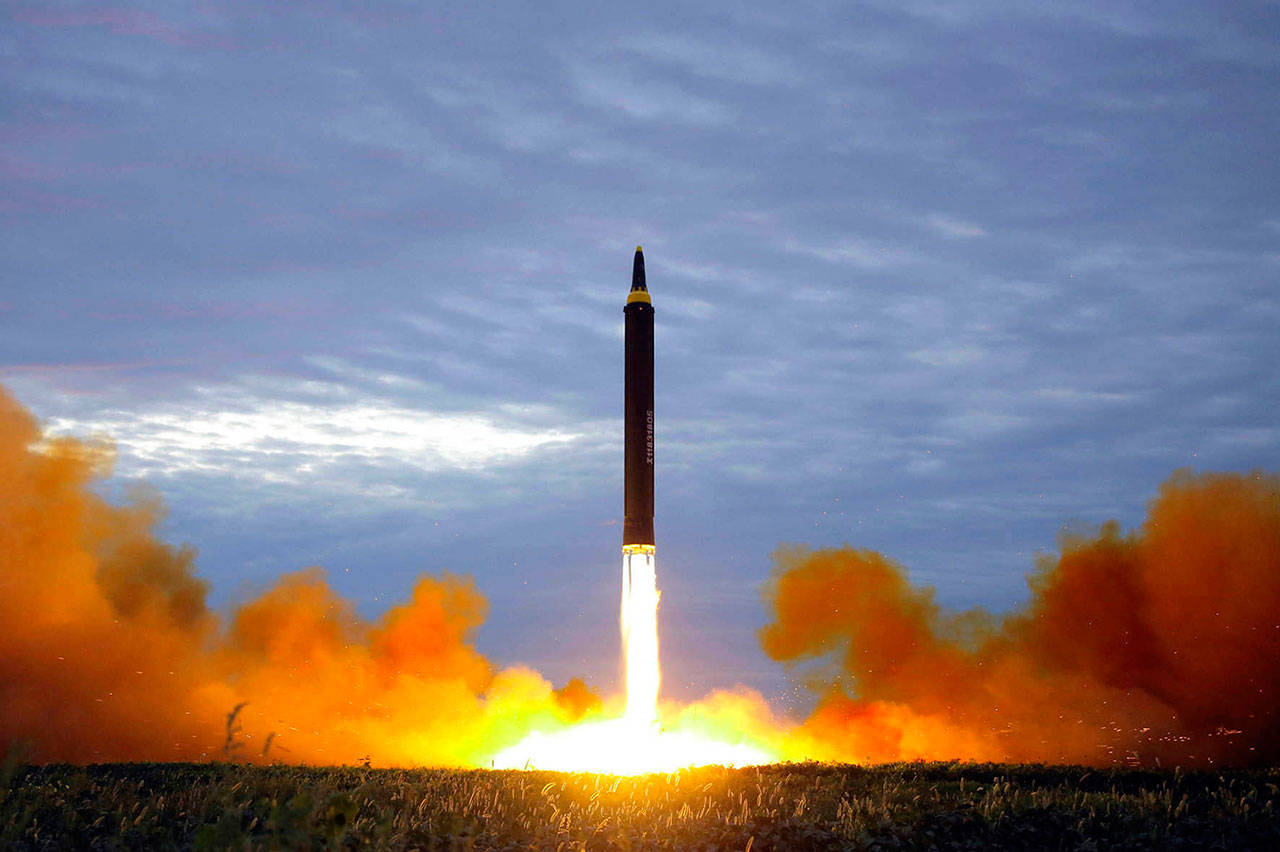By The Herald Editorial Board
Even delayed as it was by some 45 years, Daniel Ellsberg’s new book, “The Doomsday Machine: Confessions of a Nuclear War Planner,” benefits from good timing.
We may benefit, too, as Ellsberg raises the once-dormant subject.
Its publication comes during the release of the new Steven Speilberg-directed movie, “The Post,” which details The Washington Post’s struggles in 1971 to publish the Pentagon Papers, classified documents leaked by Ellsberg — then a RAND Corp., analyst for the Pentagon — that outlined the Defense Department’s and Johnson administration’s involvement in Vietnam between 1945 and 1967, the related bombing campaigns in Laos and Cambodia, and the split between stated policy and U.S. actions in Southeast Asia.
“Doomsday Machine” also arrives as tensions between the United States and North Korea fluctuate between its leaders trading barbs over the size of their “nuclear buttons” to the current South Korea Olympics detente.
Since the end of the Cold War in 1991 and the demise of the Soviet Union, the threat of nuclear war diminished in our minds, even as concerns that such weapons might fall into the hands of terrorists or detonate in an accident occasionally rose to the surface of our consciousness.
North Korea’s recent successful tests of nuclear devices and missiles has brought those threats front of mind and serve as a reminder that a stockpile of nuclear weapons remains not just in our hands but those of other nations, including the restive nations of India and Pakistan.
For added emphasis, Global Zero’s famous Doomsday Clock, now stands at two and a half minutes to midnight, the closest the clock has been to midnight since 1953.
The book for years was Ellsberg’s unfinished work, for which the Pentagon Papers were to have served as a prequel. Along with those documents, Ellsberg amassed a collection of some 7,000 pages of reports and documents related to U.S. planning for nuclear war and its possible results, planning that he participated in. It was his intention to make a similar release of those classified papers once he was past the furor and his trial over the Pentagon Papers, in order to campaign against nuclear proliferation in the U.S. and worldwide.
Ellsberg, who spoke Tuesday night at a Town Hall presentation at Seattle’s University Temple Church, explained that he had entrusted the papers to his brother’s care, who in his attempt to hide them from the government, put them in a garbage bag and buried them in a compost heap, only to be lost in a tropical storm.
While much of what he had copied remains classified, Ellsberg spent the following years reassembling some of the cache through public information requests by others of unclassified documents. His book was further delayed in a search for a publisher willing to consider it at a time when interest in the nuclear threat had waned until recently.
In the book and at the Seattle interview, Ellsberg offered a glimpse into a military philosophy that showed how a nuclear first-strike could come to be viewed as a viable option and had been used as a threat from the days of the Berlin airlift, through the Cuban missile crisis and up to today’s threats against North Korea.
It was observations made, specifically of the United State’s firebombings of Japanese cities during World War II, that helped make nuclear weapons appear an acceptable option to military planners. As horrific as the bombings of Hiroshima and Nagasaki were, killing an estimated 120,000 civilians, Ellsberg said, they paled in comparison to the deaths of some 900,000 Japanese civilians in the firebombing raids, using conventional weapons, of Tokyo and other cities.
Facing the threat from North Korea with its successful tests of nuclear devices and missiles, some in the White House may again be considering the use of nuclear weapons as an option on the table.
President Trump and some in his administration, specifically National Security Adviser H.R. McMaster, have — despite the current detente and a recent denial — considered what some call a “bloody nose” strike — nuclear or non-nuclear — targeted at nuclear weapons facilities in North Korea in retaliation for the next nuclear or missile test.
It’s difficult to believe, Ellsberg said, how such a first-strike would not quickly escalate. Regardless of North Korea’s ability to reach any region of the United States, Ellsberg said, such a conflict still risks the deaths of millions on the Korean Peninsula and even Japan. A North Korea strike on the U.S. mainland, beyond the deaths, would also likely bring martial law and the end of democratic institutions in response, he said.
Ellsberg’s book makes the case for a renewed committment from U.S. citizens and leaders, particularly in Congress — with replacement of Republican and Democratic members alike, if necessary — for taking U.S. nuclear weapons off their hair-triggers and declaring a policy that the nation will not strike first.
That option has to come off the table.
“Our military planning for nuclear war has been based on the idea that, ‘Well, if we have to carry this out, here’s how we’ll do it.’ And it’s just different ways of planning your extinction and of the human species,” he said.
Ellsberg at Town Hall
A video of Daniel Ellsberg’s interview with author Daniel Bessner is available at tinyurl.com/TownHallEllsberg.
Talk to us
> Give us your news tips.
> Send us a letter to the editor.
> More Herald contact information.

























